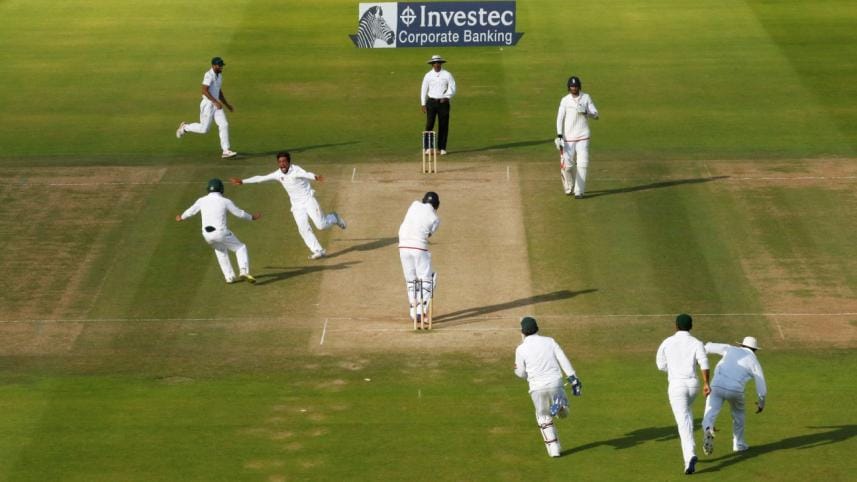Masters of making the ball talk

Amidst the wild, joyous celebrations at Lord's this evening, there was no sign of Imran Khan in the stands.
A shame, indeed, for he was amongst the glitterati during the first three days, doubtless holding court. He watches cricket in a detached manner, always amused by what he sees as the pedestrian default positions of English cricket. He is certain that the cricketers of his own land have the edge, on the proviso that they embrace the discipline required to last the distance.
Under Imran, Pakistan achieved wonderful things. To this day, Wasim Akram and company defer to his counsel. This is not to say they take him too seriously, for serious he can be, but that they respect authority and the stability it brings.
Imran must look upon Misbah-ul-Haq with admiration. Misbah has fused the talents of the players we watched at Lord's these past four days and given them a sense of freedom. For Misbah, read authority, stability and a licence to express their rare gifts.
Each morning as they warmed up, the Pakistanis loosened their bodies and minds with laughter. Yesterday, at practice, they caught so badly it could be not funny but they didn't dwell, they moved on.
This morning they held on to everything that came their way - both in the slip and gully region and in the deep. Overnight they had been transformed and there was no explaining it. On the field too, the fielding was transformed. Often with Pakistan, there is no explaining.

Imran might wonder about the vast array of coaches and confidantes that lined up for the team photograph at 10.45 on Saturday morning - nine of them in green track suits forming the middle line of the three-tiered image.
The four leaders of this group come from very different places. The head coach, Mickey Arthur, is from South Africa; the batting coach, Grant Flower, from Zimbabwe; the fellow charged with improving the fielding is Steve Rixon, an Australian; while the glue, the interpreter and the mentor for the bowlers is Mushtaq Ahmed.
They are an unlikely bunch, thrown together by the merry-go-round of the modern international game - deemed crucial one year and surplus the next - but their blend looked good, for each offers a very different character and perspective to the complex space they occupy. The sum of the parts, if well conceived, is often greater than the whole.
Whatever their value, such additions are transient. The one constant in Pakistan cricket is the inherent quality and variety of the bowling. These men rejoice in making a cricket ball talk. The use of the ball, its leather and its seam, is a culture, forensically explored and widely envied.
The 16-year-old Sachin Tendulkar played against Imran, Wasim, Waqar Younis and Abdul Qadir in 1989. Twenty-seven years later, the make-up and effect of the attack is exactly the same: three bowlers who possess the rare ability to move the ball in the air at pace and a legspinner who offers no peace.
The attack that the teenage Tendulkar thwarted was amongst the finest to play the game. The one that blew away England today is fighting for its face in the world, unable to play matches at home, almost always having to play at an adopted home. This was the first Test match Pakistan have played outside Asia in three years and, by heaven, they won it.
When Yasir Shah took his fourth wicket of the innings to make ten for the match, he sprinted with an almost demented fever before falling to the ground some 50 yards from where he had delivered the ball that Chris Woakes had edged and Younis Khan caught so well. His team-mates swamped him.
It is not just in features that Yasir resembles Lionel Messi but in celebration too. For a Messi goal in a Champions League final, read Yasir Shah's tenth wicket of the Lord's Test match.
Arguably, in this fourth innings he bowled a little too flat for the condition of the pitch and spun fewer leg-breaks that expected. But that is to split hairs. He has the most positive energy, regarding each ball as its own opportunity and moment of theatre. He bounds to the wicket, explodes at the crease and follows through in expectation. The googly spins, the slider slides and the back-spinner confuses.
In his time away from the game he might think to heed the words passed from Bill O'Reilly to Richie Benaud and from Benaud to Shane Warne: "Learn to bowl six consecutive fiercely spun and perfectly pitched leg-breaks, it'll take you three years."
Warne did it in two. Given the remarkable experiences of Test cricket already under Yasir's belt, he could add such mastery to his game in no time. Batsmen hate being beaten on the outside edge. Such defeat defines insecurity.
Legspinners must spin if at all possible and when Yasir does, it creates a panic from which there is little escape. Even as it is, every cricketer that comes to Lord's will look up at the honours board in the away dressing room and see the name Yasir Shah added to a glorious list of a gifted few to have taken ten on the hallowed ground.
It is a sobering thought that such an irresistible talent is only to become better.
Yasir's double act with Wahab Riaz through the middle of the afternoon was something to behold. Wahab bowled very fast and, from mainly around the wicket, reversed the ball with breathtaking accuracy.
It was a spell that brought his team nothing in terms of figures but plenty in terms of psychological impact. England will surely worry from here on in about reverse swing, much as the England of the 1990's did when confronted by Wasim and Waqar.
To their great credit, Jonny Bairstow and Woakes survived this onslaught for long enough to suggest that the England of 2016 might pull off something memorable but, as Wahab ran out of steam, so Yasir found another gear and Mohammad Amir returned to hammer nails into English coffins.
Amir had left this ground in disgrace six years ago but now the wheel of fortune turned dramatically in his favour as zippy, pitched-up deliveries shattered stumps that simply could not be protected by Stuart Broad and Jake Ball. These were wickets taken by force of will as much as by craft.
From the blow to his head by Broad in the first innings to the wicket that sealed Pakistan's victory in a wonderful Test match of nip and tuck and many surprises, Amir proved that the circle of life is both unpredictable and never-ending. Old Trafford is but five days away. The juices are already running.




Comments